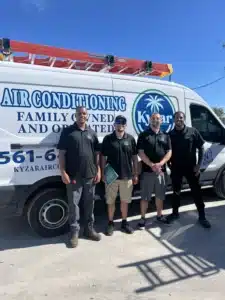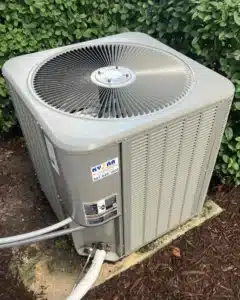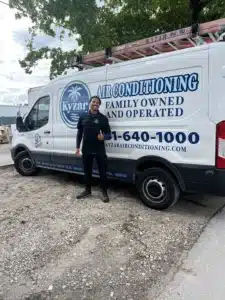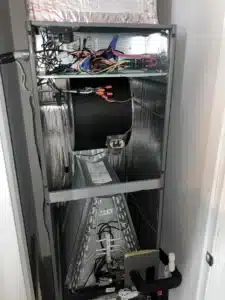Ductless air conditioning systems, also known as ductless mini-split systems, have gained popularity in Florida for their versatility and energy efficiency. These systems offer an alternative to traditional central HVAC systems by providing targeted cooling (and heating, in some models) without the need for ductwork. Here’s a detailed overview of how ductless HVAC systems work and their key benefits.
How Ductless HVAC Systems Work
Ductless HVAC systems consist of two main components: an outdoor compressor unit and one or more indoor air-handling units (evaporators). Unlike central air conditioning systems that rely on ductwork to distribute cooled air, ductless systems deliver conditioned air directly into specific zones or rooms.
- Outdoor Unit: The outdoor unit houses the compressor, condenser coil, and expansion valve. It connects to the indoor units via a conduit that contains refrigerant tubing, a power cable, and a condensate drain line.
- Indoor Units: Each indoor unit is typically mounted high on a wall or ceiling in the room it is intended to cool. These units contain an evaporator coil and a fan to distribute conditioned air into the space. Some models may also include heating capability, making them suitable for year-round comfort.
- Refrigerant Cycle: Similar to traditional HVAC systems, ductless systems operate on the principle of refrigeration. The compressor in the outdoor unit circulates refrigerant between the outdoor and indoor units. In cooling mode, warm indoor air is absorbed by the evaporator coil, and the heat is expelled outside through the refrigerant cycle.
- Control Options: Ductless systems offer individual control over each indoor unit, allowing occupants to adjust temperatures independently in different zones or rooms. This zoning capability enhances comfort and energy efficiency by eliminating the need to cool unoccupied spaces.
Benefits of Ductless HVAC Systems
- Energy Efficiency: Ductless systems are highly energy-efficient compared to central air conditioning systems, primarily because they eliminate the energy losses associated with ductwork. Each indoor unit operates independently, allowing for precise temperature control and reducing wasted energy.
- Flexible Installation: The absence of ductwork makes ductless systems easier and less invasive to install, particularly in homes or buildings where installing ducts is impractical or costly. Indoor units can be mounted on walls or ceilings with minimal disruption to interior spaces.
- Improved Indoor Air Quality: Ductless systems typically feature advanced filtration systems that help remove dust, allergens, and other airborne particles from the air. This can contribute to better indoor air quality and a healthier living environment.
- Quiet Operation: Ductless systems are known for their quiet operation compared to traditional HVAC systems. The compressor unit is located outdoors, reducing indoor noise levels and enhancing overall comfort.
- Cost Savings: Although the initial investment in a ductless system may be higher than that of a traditional system, the energy savings and lower operating costs over time often offset the upfront expense. Additionally, rebates and incentives may be available for installing energy-efficient ductless systems.
Conclusion
Ductless HVAC systems offer a flexible and efficient cooling (and heating) solution for homes and businesses in Florida. Whether you’re looking to retrofit an older home without existing ductwork or seeking to improve energy efficiency and comfort, ductless systems provide a reliable alternative. Contact our HVAC experts to learn more about how a ductless system can benefit your specific needs and enhance indoor comfort throughout the year.





